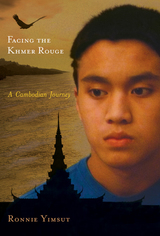


As a child growing up in Cambodia, Ronnie Yimsut played among the ruins of the Angkor Wat temples, surrounded by a close-knit community. As the Khmer Rouge gained power and began its genocidal reign of terror, his life became a nightmare. In this stunning memoir, Yimsut describes how, in the wake of death and destruction, he decides to live.
Escaping the turmoil of Cambodia, he makes a perilous journey through the jungle into Thailand, only to be sent to a notorious Thai prison. Fortunately, he is able to reach a refugee camp and ultimately migrate to the United States, where he attended the University of Oregon and became an influential leader in the community of Cambodian immigrants. Facing the Khmer Rouge shows Ronnie Yimsut’s personal quest to rehabilitate himself, make a new life in America, and then return to Cambodia to help rebuild the land of his birth.

Edward S. Herman
'Chandler deftly unpicks the hypocrisy and double standards behind our "ethical" bombing in the balkans and Asia.'
Independent
'Chandler's book is thorough and relentless in its critique of human rights consensus.'
Spiked
'David Chandler has emerged in recent years as one of Britain's foremost critics of the hypocrisy of human rights.'
The Spectator
This new and updated edition of David Chandler's acclaimed book takes a critical look at the way in which human rights issues have been brought to the fore in international affairs. The UN and Nato's new policy of interventionism--as shown in Iraq, Somalia, Bosnia, Kosovo and East Timor--has been hailed as part of a new 'ethical' approach to foreign policy. David Chandler offers a rigorous critique of this apparently benign shift in international relations to reveal the worrying political implications of a new human rights discourse. He asks why the West can now prioritise the rights of individuals over the traditional rights of state sovereignty, and why this shift has happened so quickly. Charting the development of a human rights-based foreign policy, he considers the theoretical problems of defining human rights and sets this within the changing framework of international law. Meticulous and compelling, From Kosovo to Kabul and Beyond offers a disturbing insight into the political implications of a human rights-led foreign policy, and the covert agenda that it conceals.
David Chandler is Professor of International Relations, Centre for the Study of Democracy, University of Westminster. He has written widely on democracy, human rights and international relations and is also the author of Bosnia: Faking Democracy After Dayton (Pluto Press, 1999/ 2000) and Constructing Global Civil Society: (2004), editor of Rethinking Human Rights: Critical Approaches to International Politics (2002) and Peace without Politics: Ten Years of State-Building in Bosnia (2005), and co-editor of Global Civil Society: Contested Futures (2005).
READERS
Browse our collection.
PUBLISHERS
See BiblioVault's publisher services.
STUDENT SERVICES
Files for college accessibility offices.
UChicago Accessibility Resources
home | accessibility | search | about | contact us
BiblioVault ® 2001 - 2024
The University of Chicago Press









